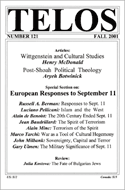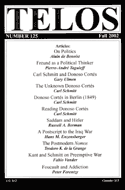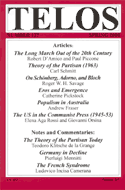By Johannes Grow · Tuesday, June 3, 2014  The terrorist attacks on 9/11 created a chain of events that has led not only to the “othering” of Islam and its followers, but also to an increase in the securitization of society as a whole. In “Sovereignty, Empire, Capital, and Terror,” John Milbank examines the aftermath of the 9/11 terrorist attacks, notably the wars in Iraq and Afghanistan and the increasing intervention of governments into the privacy of their respective populations. He questions the wars and the increasingly illiberal turn by the government in regards to dealing with terrorists and criminals and the elimination of due process and, in some cases, habeus corpus. He writes that, “the question that one should ask in response to the immediate aftermath the events of September 11 is why there was outrage on such a gigantic scale” (146). He goes on to identify two reasons: first, the threat against the sovereign, and second, the increasing legitimization by Western governments to intervene in so-called “rogue or failed states,” to ensure the spread of the neoliberal market and prevent the defection of these states from the Western dominated capitalist system. Although there are indeed questions concerning the delineation between national security and the democratic process, the answers to these questions are harder to come by. The terrorist attacks on 9/11 created a chain of events that has led not only to the “othering” of Islam and its followers, but also to an increase in the securitization of society as a whole. In “Sovereignty, Empire, Capital, and Terror,” John Milbank examines the aftermath of the 9/11 terrorist attacks, notably the wars in Iraq and Afghanistan and the increasing intervention of governments into the privacy of their respective populations. He questions the wars and the increasingly illiberal turn by the government in regards to dealing with terrorists and criminals and the elimination of due process and, in some cases, habeus corpus. He writes that, “the question that one should ask in response to the immediate aftermath the events of September 11 is why there was outrage on such a gigantic scale” (146). He goes on to identify two reasons: first, the threat against the sovereign, and second, the increasing legitimization by Western governments to intervene in so-called “rogue or failed states,” to ensure the spread of the neoliberal market and prevent the defection of these states from the Western dominated capitalist system. Although there are indeed questions concerning the delineation between national security and the democratic process, the answers to these questions are harder to come by.
Continue reading →
By Johannes Grow · Tuesday, November 19, 2013 As an occasional feature on TELOSscope, we highlight a past Telos article whose critical insights continue to illuminate our thinking and challenge our assumptions. Today, Johannes Grow looks at Russell A. Berman’s “Saddam and Hitler: Rethinking Totalitarianism” from Telos 125 (Fall 2002).
 In “Saddam and Hitler: Rethinking Totalitarianism,” Russell A. Berman examines the limits of current efforts to understand totalitarianism in light of the juxtaposition of Nazi Germany and Baathist Iraq. He questions the “cultural approaches” often implemented when approaching the study of the Nazi years. Berman doubts whether the German people, under the increasingly violent and fanatical Nazi regime, were truly a Volksgemeinschaft, a happy population believing in every word of the leader, be it true or false, or as the Baathist regime in Iraq demonstrated, a regime of violence, with the party and the leader as the center node propagating terror throughout the state. The author examines three problems present in contemporary discussions of the Nazi regime that may be further elucidated through a juxtaposition of Hitler’s “movement” with the old Saddam regime. The first involves the futility of defining these regimes as either “Left” or “Right.” These types of distinctions do not allow for a full exploration of the effects of these regimes. The second problem is the aligning of Nazism with a sort of “cultural hegemony” rather than with an environment of coercion, violence, and politics. The third concern involves limiting the question of totalitarianism to a certain period history rather than examining its effects on the present. In “Saddam and Hitler: Rethinking Totalitarianism,” Russell A. Berman examines the limits of current efforts to understand totalitarianism in light of the juxtaposition of Nazi Germany and Baathist Iraq. He questions the “cultural approaches” often implemented when approaching the study of the Nazi years. Berman doubts whether the German people, under the increasingly violent and fanatical Nazi regime, were truly a Volksgemeinschaft, a happy population believing in every word of the leader, be it true or false, or as the Baathist regime in Iraq demonstrated, a regime of violence, with the party and the leader as the center node propagating terror throughout the state. The author examines three problems present in contemporary discussions of the Nazi regime that may be further elucidated through a juxtaposition of Hitler’s “movement” with the old Saddam regime. The first involves the futility of defining these regimes as either “Left” or “Right.” These types of distinctions do not allow for a full exploration of the effects of these regimes. The second problem is the aligning of Nazism with a sort of “cultural hegemony” rather than with an environment of coercion, violence, and politics. The third concern involves limiting the question of totalitarianism to a certain period history rather than examining its effects on the present.
Continue reading →
By Johannes Grow · Tuesday, August 27, 2013 As an occasional feature on TELOSscope, we highlight a past Telos article whose critical insights continue to illuminate our thinking and challenge our assumptions. Today, Johannes Grow looks at Pierluigi Mennitti’s “Germany in Decline,” from Telos 127 (Spring 2004).
 In “Germany in Decline,” from Telos 127 (Spring 2004), Pierluigi Mennitti addresses Berlin’s inability to enact “true” reforms, which has subsequently led to a decline in its economic, geopolitical, and cultural influence. Through an examination of a contemporaneous Der Spiegel article, Mennitti demonstrates the reluctance of the Federal Republic to accept such thoroughgoing Reformen, which would allow it to crawl out of its then apparent decline and to depend far less on the economic strategies propounded during the so-called “economic miracle” of the post-1949 era. Although it would seem to have been premature to write off Germany as the “economic engine” in Europe, his article nevertheless offers several accurate points. For example, Mennitti asserts that Germany In “Germany in Decline,” from Telos 127 (Spring 2004), Pierluigi Mennitti addresses Berlin’s inability to enact “true” reforms, which has subsequently led to a decline in its economic, geopolitical, and cultural influence. Through an examination of a contemporaneous Der Spiegel article, Mennitti demonstrates the reluctance of the Federal Republic to accept such thoroughgoing Reformen, which would allow it to crawl out of its then apparent decline and to depend far less on the economic strategies propounded during the so-called “economic miracle” of the post-1949 era. Although it would seem to have been premature to write off Germany as the “economic engine” in Europe, his article nevertheless offers several accurate points. For example, Mennitti asserts that Germany
Continue reading →
|
|
 The terrorist attacks on 9/11 created a chain of events that has led not only to the “othering” of Islam and its followers, but also to an increase in the securitization of society as a whole. In “Sovereignty, Empire, Capital, and Terror,” John Milbank examines the aftermath of the 9/11 terrorist attacks, notably the wars in Iraq and Afghanistan and the increasing intervention of governments into the privacy of their respective populations. He questions the wars and the increasingly illiberal turn by the government in regards to dealing with terrorists and criminals and the elimination of due process and, in some cases, habeus corpus. He writes that, “the question that one should ask in response to the immediate aftermath the events of September 11 is why there was outrage on such a gigantic scale” (146). He goes on to identify two reasons: first, the threat against the sovereign, and second, the increasing legitimization by Western governments to intervene in so-called “rogue or failed states,” to ensure the spread of the neoliberal market and prevent the defection of these states from the Western dominated capitalist system. Although there are indeed questions concerning the delineation between national security and the democratic process, the answers to these questions are harder to come by.
The terrorist attacks on 9/11 created a chain of events that has led not only to the “othering” of Islam and its followers, but also to an increase in the securitization of society as a whole. In “Sovereignty, Empire, Capital, and Terror,” John Milbank examines the aftermath of the 9/11 terrorist attacks, notably the wars in Iraq and Afghanistan and the increasing intervention of governments into the privacy of their respective populations. He questions the wars and the increasingly illiberal turn by the government in regards to dealing with terrorists and criminals and the elimination of due process and, in some cases, habeus corpus. He writes that, “the question that one should ask in response to the immediate aftermath the events of September 11 is why there was outrage on such a gigantic scale” (146). He goes on to identify two reasons: first, the threat against the sovereign, and second, the increasing legitimization by Western governments to intervene in so-called “rogue or failed states,” to ensure the spread of the neoliberal market and prevent the defection of these states from the Western dominated capitalist system. Although there are indeed questions concerning the delineation between national security and the democratic process, the answers to these questions are harder to come by.  In “Saddam and Hitler: Rethinking Totalitarianism,” Russell A. Berman examines the limits of current efforts to understand totalitarianism in light of the juxtaposition of Nazi Germany and Baathist Iraq. He questions the “cultural approaches” often implemented when approaching the study of the Nazi years. Berman doubts whether the German people, under the increasingly violent and fanatical Nazi regime, were truly a Volksgemeinschaft, a happy population believing in every word of the leader, be it true or false, or as the Baathist regime in Iraq demonstrated, a regime of violence, with the party and the leader as the center node propagating terror throughout the state. The author examines three problems present in contemporary discussions of the Nazi regime that may be further elucidated through a juxtaposition of Hitler’s “movement” with the old Saddam regime. The first involves the futility of defining these regimes as either “Left” or “Right.” These types of distinctions do not allow for a full exploration of the effects of these regimes. The second problem is the aligning of Nazism with a sort of “cultural hegemony” rather than with an environment of coercion, violence, and politics. The third concern involves limiting the question of totalitarianism to a certain period history rather than examining its effects on the present.
In “Saddam and Hitler: Rethinking Totalitarianism,” Russell A. Berman examines the limits of current efforts to understand totalitarianism in light of the juxtaposition of Nazi Germany and Baathist Iraq. He questions the “cultural approaches” often implemented when approaching the study of the Nazi years. Berman doubts whether the German people, under the increasingly violent and fanatical Nazi regime, were truly a Volksgemeinschaft, a happy population believing in every word of the leader, be it true or false, or as the Baathist regime in Iraq demonstrated, a regime of violence, with the party and the leader as the center node propagating terror throughout the state. The author examines three problems present in contemporary discussions of the Nazi regime that may be further elucidated through a juxtaposition of Hitler’s “movement” with the old Saddam regime. The first involves the futility of defining these regimes as either “Left” or “Right.” These types of distinctions do not allow for a full exploration of the effects of these regimes. The second problem is the aligning of Nazism with a sort of “cultural hegemony” rather than with an environment of coercion, violence, and politics. The third concern involves limiting the question of totalitarianism to a certain period history rather than examining its effects on the present.  In “Germany in Decline,” from Telos 127 (Spring 2004), Pierluigi Mennitti addresses Berlin’s inability to enact “true” reforms, which has subsequently led to a decline in its economic, geopolitical, and cultural influence. Through an examination of a contemporaneous Der Spiegel article, Mennitti demonstrates the reluctance of the Federal Republic to accept such thoroughgoing Reformen, which would allow it to crawl out of its then apparent decline and to depend far less on the economic strategies propounded during the so-called “economic miracle” of the post-1949 era. Although it would seem to have been premature to write off Germany as the “economic engine” in Europe, his article nevertheless offers several accurate points. For example, Mennitti asserts that Germany
In “Germany in Decline,” from Telos 127 (Spring 2004), Pierluigi Mennitti addresses Berlin’s inability to enact “true” reforms, which has subsequently led to a decline in its economic, geopolitical, and cultural influence. Through an examination of a contemporaneous Der Spiegel article, Mennitti demonstrates the reluctance of the Federal Republic to accept such thoroughgoing Reformen, which would allow it to crawl out of its then apparent decline and to depend far less on the economic strategies propounded during the so-called “economic miracle” of the post-1949 era. Although it would seem to have been premature to write off Germany as the “economic engine” in Europe, his article nevertheless offers several accurate points. For example, Mennitti asserts that Germany 

